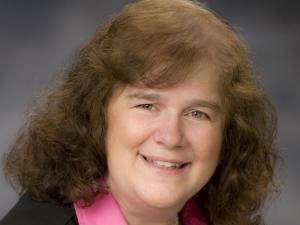Featured
Tags
Share

Everyone dreams they will find a career that blends all of their interests. Nursing informatics pioneer Dee McGonigle, PhD, RN, FAAN, CNE, found that sweet spot when she combined her love for computers with her passion for nursing and education.
Now a professor of informatics in Chamberlain’s Master of Science in Nursing program, Dr. McGonigle is a fellow in the American Academy of Nursing and serves as the editor-in-chief of the Online Journal of Nursing Informatics. She discusses her passion for nursing informatics and the past, present, and future of the specialty below:
How did you enter the nursing informatics field?
My first love was teaching before I became a nurse. I also always enjoyed computers — I had one of the first desktop computers. I loved computing and exploring how it could facilitate a nurse’s ability to inform their practice while gaining more information.
I developed and taught the first nursing informatics course offered at Penn State. I’m happy to have had the vision to see what computers could do for us. Here we are now, we’re living it, and it keeps getting better.
What is nursing informatics?
Nursing informatics encompasses cognitive, computer, information and nursing sciences. We pull all these sciences together to manage the data and information in healthcare. Our ultimate goal is to improve patient care and outcomes, as well as advance the nursing profession.
What are some of the hot areas in nursing informatics right now?
Patient satisfaction is one area that just hit this October as part of President Obama’s healthcare reforms. Patients have to be satisfied with the care they receive in a facility or some of that hospital’s Medicare reimbursement will be taken and disbursed among hospitals that do have high patient satisfaction rates. Hospitals need someone to track all of that information and use all the metrics they can to ascertain what they need to do and how they need to report it. That’s why I see nursing informatics growing and blossoming.
Another hot area right now is nursing simulation. You’re creating a very safe environment for nurses to practice skills, which I just love. Those simulations need to be programmed and the scenarios need to be set. Informatics nurses are also always enhancing the ways that patients receive information. For instance, some nurses have created their own blogs, Wikispaces or digital groups to distribute information to patients.
There are so many ways that nursing informatics can impact care, it’s unbelievable.
What does the typical day of an informatics nurse entail?
A typical day involves project management and ensuring all your projects are where they need to be at that given time based on the project plan. Good teamwork skills and being able to assess where the teams are on the projects is key.
Informatics nurses also do a lot of troubleshooting and educating. We help nurses understand how the information systems work and help IT understand how nursing works. Informatics nurses are bilingual—they can talk IT and can talk nursing. They’re the liaison and are responsible for getting everybody to common ground.
Where do you see the specialty going in the next 5 years?
Everyone is going electronic and the current demand for informatics nurses is surging through the roof. It’s expanded so much that even administrators of hospitals are looking to learn about informatics so they too can get in the game and understand what’s being said when they’re told they need things, or things need to be developed or refined.
Everyone’s been saying we’re going to need 50,000 more IT people in healthcare by 2014. More hospitals and healthcare settings are going to begin to embrace the nursing informatics role in a way they haven’t before.
What topics do you feel most passionately about in the field?
People still don’t understand what nursing informatics is and what it can do for them. It’s not about sending emails or creating PowerPoints. We really need to raise awareness around the specialty, especially among our colleagues in education so it is included in the nursing curriculum. Every graduate of a nursing program should understand informatics so they can function properly and enhance patient care.
What courses do you teach at Chamberlain?
I teach NR-542, Managing Data and Information, and the Informatics Nurse Practicums. In the practicum courses, we focus not only on the application of learning, but also on the project management process. Students enter facilities and conduct real-life projects. That hands-on piece is so potent because they’re not doing something on paper, they’re doing an actual project, real-time, at a facility with the supervision of a mentor. It’s a wonderful way to learn—if you don’t have the project management skills and expertise when you enter the program, you’ll certainly have them when you graduate.
What have been some of the practicum projects for your nursing informatics students?
One of our students curated all the educational materials available to patients at her site and created a system to make them easily accessible. The ability for the patient to access that data quickly was not available in the system before her project.
Another student worked with the military to develop patient simulator scenarios for first-responders in the field during battle. One student developed a system that streamlined the process of getting information from organ donors and entering them into the donor stream. We’ve had students hired at their practicum sites, which speaks volumes.
What would you say makes an extraordinary nurse?
An exceptional nurse is one who truly cares, who can critically think, and who can reflect on the patient situation in light of the literature, research, evidence and their own clinical experience to provide the best care possible.
Learn more about the Informatics Specialty Track in Chamberlain’s Master of Science in Nursing degree program!
By Molly Mattison
More from Home
Request More Information
To receive the Chamberlain University Program Guide, including associated career paths, please select a program of study.






